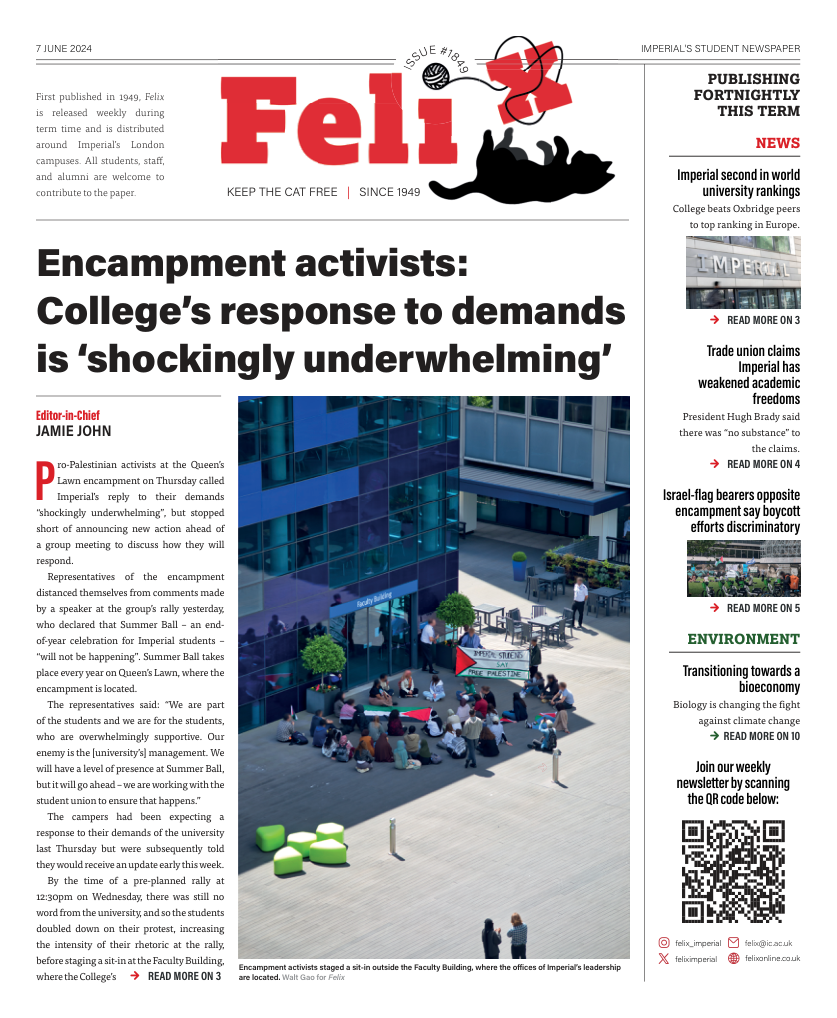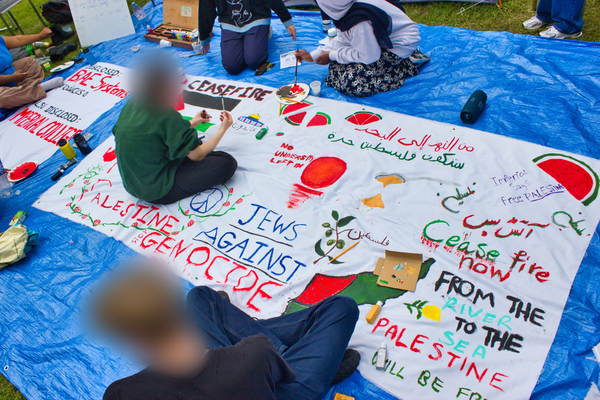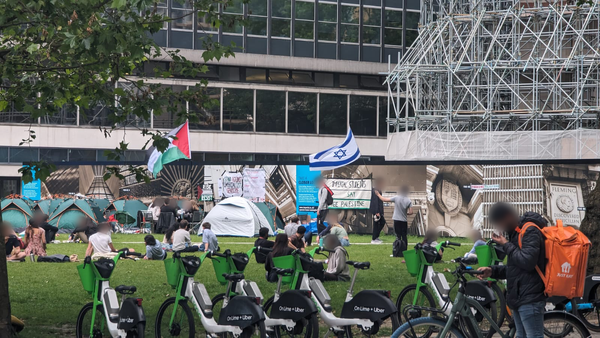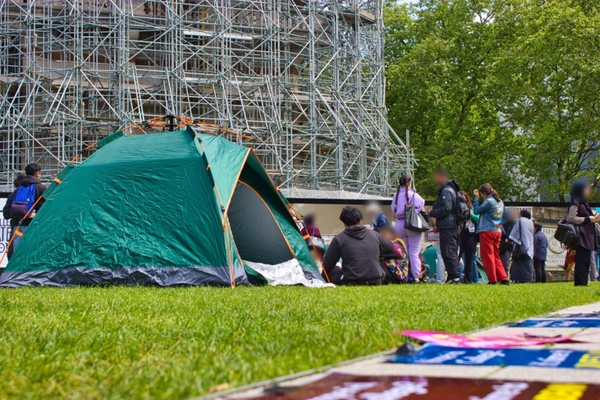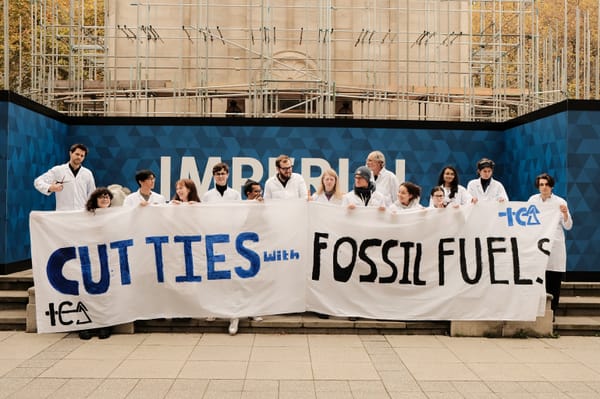Encampment activists stage sit-in outside Imperial College management offices
Summer Ball not happening, say activists after College delays response to demands.
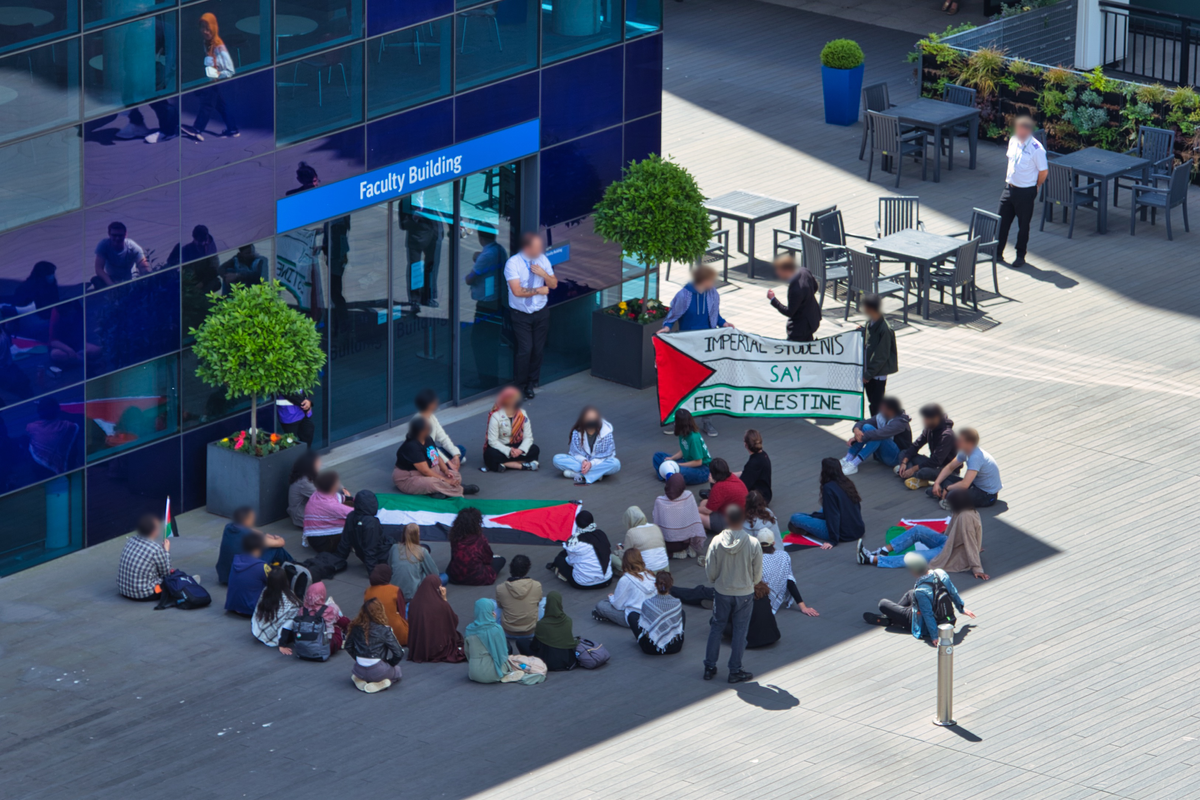
Pro-Palestinian activists at Imperial escalated their action on Wednesday, staging a sit-in outside the offices of the College’s senior management team and declaring their intention to disrupt the university’s flagship summer ball.
The campers had been expecting a response to their demands of the university last Thursday but were subsequently told they would receive an update early this week.
By the time of a pre-planned rally at 12:30pm, there was still no word from the university, and so the students doubled down on their protest, increasing the intensity of their rhetoric at the rally, before staging a sit-in at the Faculty Building, where the College’s most senior staff work.
Read our earlier interview with an activist at the encampment here.
For the first time, protesters named President Hugh Brady and Provost Ian Walmsley in their chants, shouting “Hugh Brady, shame on you” and “Ian Walmsley, shame on you”.
One speaker at the rally had a message for Brady and Walmsley, the two most senior leaders at the College.
“When you go home to your big mansion and your six-figure salary, do you hear the screams of children [in Gaza] at night?” he asked through a megaphone.
“I think using their names now is really important, to hold management to account,” he told the gathering of around 65 activists, next to the Queen’s Lawn encampment that was established two weeks ago.
He said that the Great Exhibition Road Festival, which takes place at venues in South Kensington including Imperial, and the Summer Ball, which will be held on Queen’s Lawn, “will not be happening”.
At 1pm, the group left the encampment and walked to Dalby Court, chanting: “Imperial College, blood on your hands.”
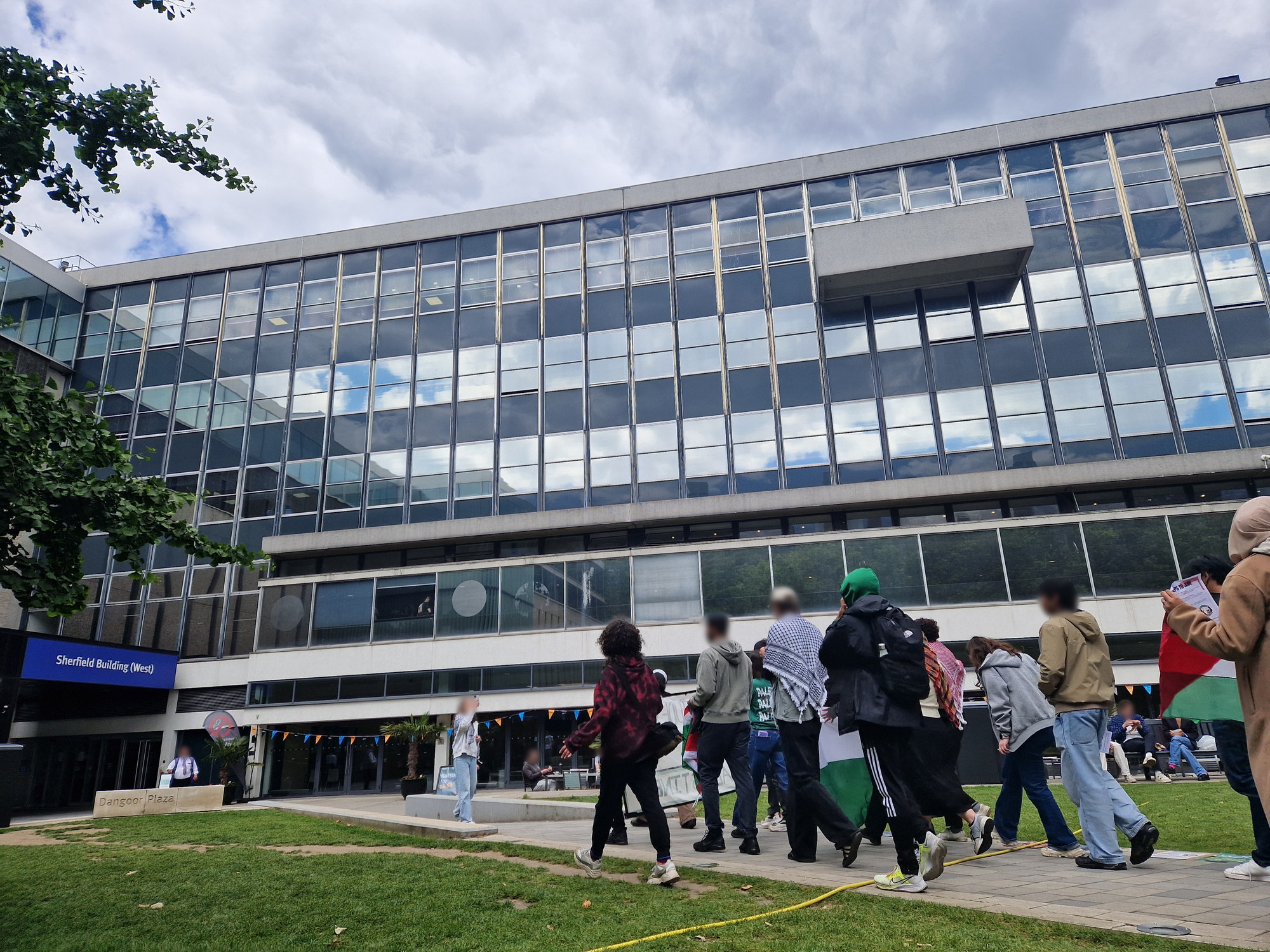
They gathered at the entrance to the Faculty Building and continued their chants, shouting: “Disclose, divest, we will not stop, we will not rest,” and “We are the students, we’ll not be silenced.”
One speaker led a call-and-response chant of: “Whose research?” (“Our research”) and “Whose money?” (“Our money”).
The group, now numbering 40 activists, staged a sit-in at the doors to the building as staff on the upper levels looked downwards at the commotion.
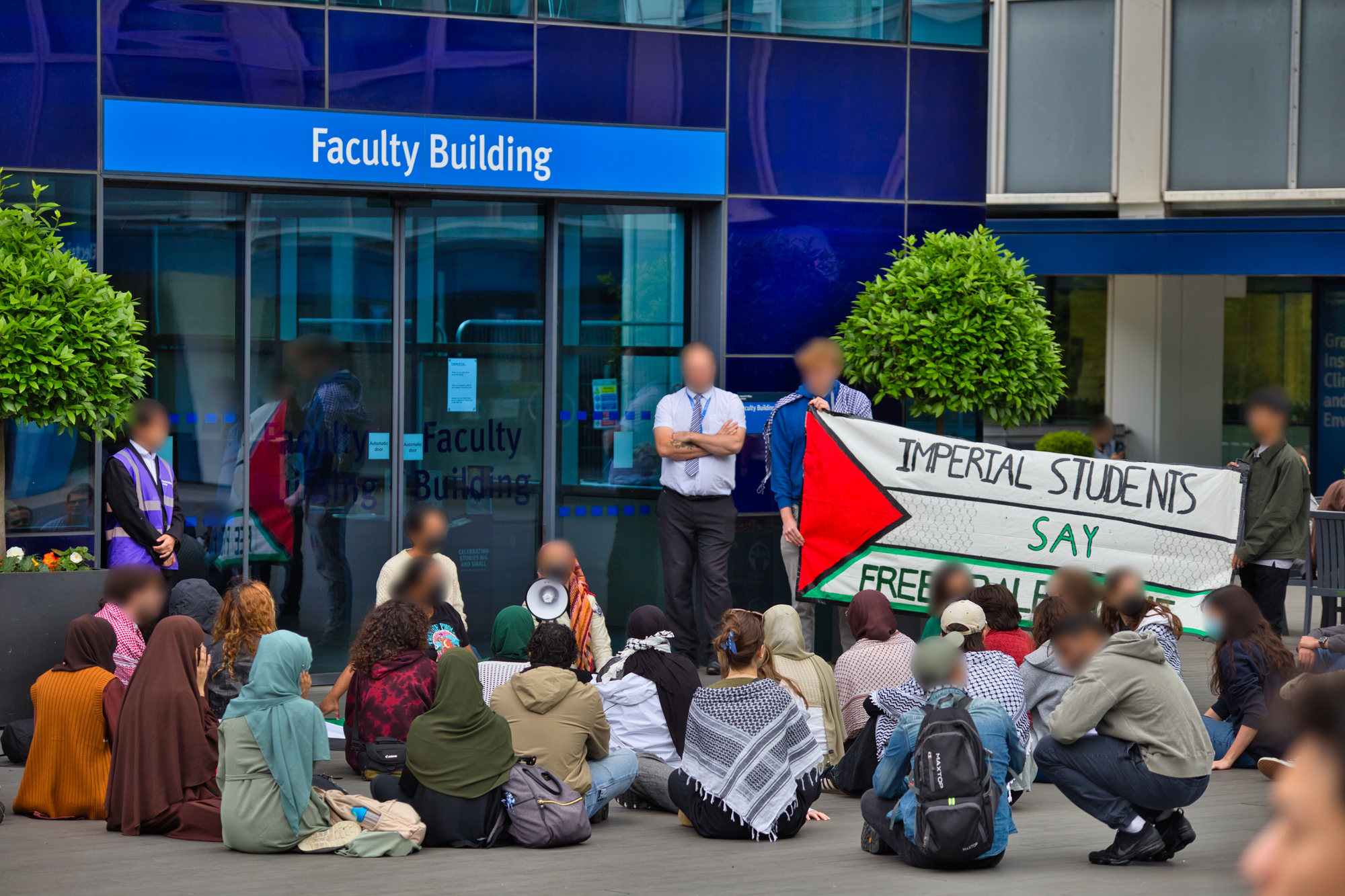
A man who approached a security guard stationed at the entrance to the Faculty Building was met with shouts of “Shame, shame, shame,” and walked away shortly afterwards.
Another speaker reaffirmed the groups intention to disrupt summer festivities, saying: “We need to shut this campus down. We don’t care about the Exhibition Road festival and Summer Ball.”
Addressing comments allegedly made at a meeting that Imperial held with activists last week, the speaker added: “Vice-Provost Peter Haynes said this university is not a democracy, let’s show them who actually runs this university.”
The protestors want Imperial to establish ‘an independent student and staff body to ensure compliance’ with their demands and ‘provide oversight on future investments’.
The group returned to the encampment at 2pm, turning heads as they processed through the Sherfield Walkway and Senior Common Room on their way back.
Pro-Palestinian activists at Imperial have assembled a series of demands that they want Imperial to agree to before ending their encampment. They accuse the university of ‘complicity in Israeli occupation, apartheid, and genocide’ because of its ‘investment in and industry ties to companies profiting off the abuse of Palestinian rights.’
The activists have compiled a paper that highlights 17 companies the university has holdings in via the College endowment – its investment portfolio. The businesses include several household names such as McDonald’s, which was boycotted by pro-Palestinian activists because its Israeli franchise has distributed free meals to Israeli soldiers since 7th October last year.
Earlier this year, McDonald’s bought back all of its Israeli restaurants from the franchisee after suffering a fall in sales in the wake of the boycott. The company refutes claims it is ‘funding or supporting any governments involved in this conflict’ and says it ‘abhor[s] violence of any kind’.
In addition to their investment demands, activists at Imperial want the university to cut research ties with businesses linked to the Israeli war effort, fund scholarships for Palestinian students, and release a statement condemning Israel’s actions in Gaza.
On 7th October, Hamas launched attacks on Israel, killing around 1,200 people and taking a further 252 hostages, according to Israeli authorities.
Over 36,000 people have been killed in Israel’s retaliatory attacks in Gaza since then, according to Palestinian officials from Gaza’s Hamas-run health ministry.
Two weeks ago, Imperial said that it would continue to allow College members to explore ‘all topics… in a respectful manner within the law.
However, it said that ‘delivering ongoing commentary on geopolitical events would make it difficult to realise this role… Any protest that becomes hateful, unlawful or constitutes harassment or bullying will not be tolerated.’
The university did not respond to a request for comment.
How did Felix estimate crowd sizes for this article?
The crowd-size figures given in this piece were obtained by counting the number of protest participants in photographs of the demonstrations.

